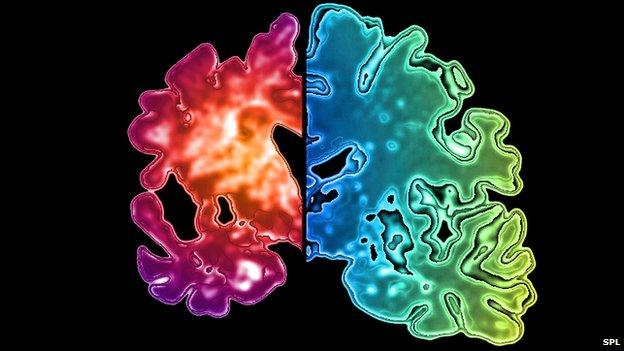Scottish researchers study link between Alzheimer's and diet
- Published

Scottish researchers are to study the gut health of people with Alzheimer's disease to see if there is a link between their diet and behaviour.
The project is the first of its kind and it is being led by experts at the University of Aberdeen.
Scientists will examine gut samples taken from people in local care homes.
They will look for differences between the bacteria found in Alzheimer's patients with and without challenging behaviour.
If the study is successful, the team at the university's Rowett Institute hope their research could lead to moves to use diet to control symptoms of Alzheimer's.
The research was launched as there is increasing evidence that microbes in the gut are a key link between certain nutrients and brain function.
Researchers will collect faecal samples from three groups of people - people with dementia and challenging behaviour, people with dementia without challenging behaviour and a control group of people without dementia.
By studying these samples, the researchers hope to identify whether there are notable differences in the gut diversity of the three groups.


How is the gut kept healthy?
The population of microbes, including bacteria, inside the human gut is known as the gut microbiota.
A diverse and balanced population of gut microbiota is important for keeping a strong immune system and helping digestion.
Good bacteria living in the gut are fed with substances called prebiotics, such as inulin.
Inulin can be found in Jerusalem artichokes, chicory root, onions, garlic and leeks.

Prof Alex Johnstone, from the University of Aberdeen's Rowett Institute, said if the study succeeds it could help establish a link between diet and behaviour.
Experts then hope that there will be future research on the relationship between diet, gut microbiota and challenging behaviour in Alzheimer's disease.
Prof Johnstone added: "It has become evident that there is a two-way communication between the gut microbiome and the brain.
"That relationship is not yet fully understood but the goal for us is to identify whether changes in diet can affect the clinical symptoms associated with dementia.
"This study is the first of its kind and could lead to the possibility of dietary intervention as a solution to prevent behavioural and psychosocial issues which are associated with adverse outcomes as well as distressing to people with dementia, their family and carers.
"We want to explore whether or not the gut-brain axis plays a key role in behavioural changes in dementia."
The study has been funded by Tenovus Scotland Grampian, the Scottish government and NHS Grampian endowments.
- Published13 September 2017

- Published23 October 2017
